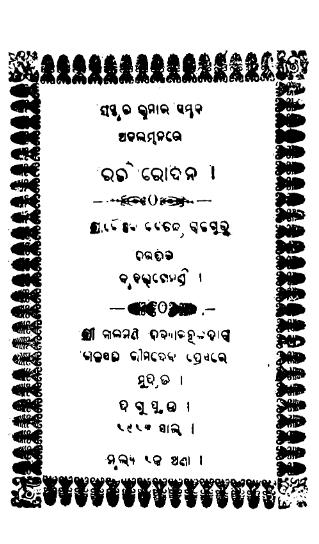In the rich tapestry of Odia literature, poetry has often served as a conduit for expressing profound emotions and cultural values. Among the notable works that exemplify this tradition is Rati Rodana, published in 1913 by the revered poet Baisnaba Kabichandra Rajaguru. This collection stands out not only for its lyrical beauty but also for its exploration of love, devotion, and the intricate relationship between the mundane and the divine.
Rati Rodana, which translates to The Fulfilling of Love, is composed with deep emotional resonance, inviting readers into a world that celebrates love in its various forms—romantic, spiritual, and universal. Rajaguru, well-versed in the profound teachings of the Bhakti movement, imbues his verses with a sense of spiritual longing, intertwining the earthly experience of love with the divine presence. This duality creates a rich texture within the poetry, allowing readers to engage with both the tangible and the transcendent aspects of love.
One of the remarkable features of Rati Rodana is Rajaguru’s ability to evoke the beauty of nature as a backdrop for romantic and spiritual themes. His poetry often draws vivid imagery from the natural world, using seasons, flowers, and celestial phenomena to convey the emotions tied to love and devotion. For instance, the beauty of the spring season might symbolize new beginnings in love, while the moon often represents the constancy and serenity of divine presence. This connection to nature not only enhances the aesthetic quality of the poetry but also reinforces the idea that love is both a natural and a spiritual force.
Rajaguru’s linguistic prowess shines through in Rati Rodana. His use of the Odia language is both artistic and accessible, making his poetry resonate with a wide audience. The rhythmic flow of his verses, coupled with the musicality inherent in Odia, transforms the reading experience into one of melodic enjoyment. Rajaguru’s careful choice of words creates a lyrical cadence that captivates the reader, making each poem a celebration of sound as much as of meaning.
A prominent theme in Rati Rodana is the exploration of devotion beyond the confines of romantic love. Rajaguru masterfully extends the notion of love to a spiritual plane, invoking the idea that human love can be a reflection of divine love. His verses often articulate a yearning for connection with the divine, illustrating how earthly attachments can lead us to greater spiritual truths. This theme aligns with the principles of the Bhakti movement, where personal devotion to God transcends ritualistic practices, emphasizing love and emotional connection.
Furthermore, Rati Rodana plays a significant role in cultural preservation, encapsulating the sentiments of early 20th-century Odisha. In a time when society was undergoing significant transformations, Rajaguru’s poetry served as a reminder of the enduring power of love—both in personal relationships and in our relationship with the divine. Through his work, he not only articulated the feelings of his contemporary society but also laid the groundwork for future generations of poets and lovers of literature.
Books Info
| Books name | Rati Rodana / ରାତି ରୋଦନ |
| Author | Baisnaba Kabichandra Rajaguru |
| No Of pages | 18 |
| Publisher | NA |
| Publication | 1913 |
| Printed At | Gajapati Bhimadev Press |
| Distributor | NA |

